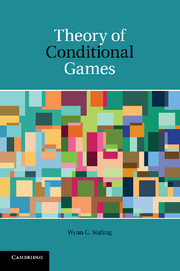2 - Conditioning
Published online by Cambridge University Press: 05 January 2012
Summary
The manner in which mathematical theories are applied does not depend on preconceived ideas: it is a purposeful technique depending on, and changing with, experience.
– William Feller An Introduction to Probability Theory and Its Applications (Wiley, 1950)Given a group of stakeholders, a classical rational decision-making model comprises three distinct structural elements. First is the set of feasible actions (those actions that satisfy the logical, physical, and economic constraints associated with each stakeholder); second is the set of possible outcomes that can obtain as a result of all players taking action; and third is a preference ordering of the outcomes for each stakeholder. There is also a fourth component, namely, the concept of logic, or rationality, that governs decision making, but that component is not a part of the model structure. In this chapter, we focus exclusively on the structural components and defer consideration of rationality until Chapter 3.
As discussed in Chapter 1, under the classical game theory model, all players come to the moment of decision with all of their preference orderings completely and categorically defined. This model, however, does not permit group-level preferences to be defined, which significantly limits the use of classical game theory as a model of groups whose members possess sophisticated social relationships. This limitation is addressed by replacing categorical preference orderings with conditional preference orderings that explicitly account for the social influence that the players exert on each other.
- Type
- Chapter
- Information
- Theory of Conditional Games , pp. 32 - 72Publisher: Cambridge University PressPrint publication year: 2011



